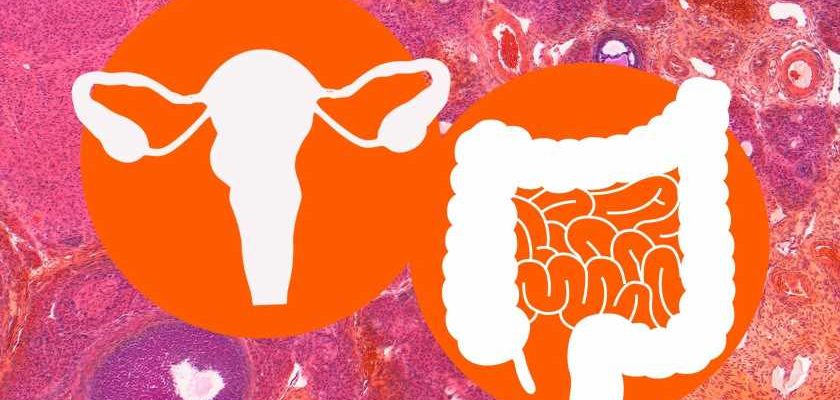A doctor breaks down the link between your period cycle and gut health – and they work closer than you might think.
Have you ever noticed changes in your bowels around the time of your monthly bleed? It can feel hellish and confusing when you already have hormonal bloat and then your gut expands even more from digestive discomfort. But it’s just one part of the never-ending interaction between our gut and reproductive system.
“The menstrual cycle is a complex system that is controlledby thefemalesex hormones, mainly oestrogen and progesterone. Levels of these hormonesrise and fallthroughout the menstrual cycle and can affect the gut in different ways,” says Dr Claire Shortt, nutritionist and lead scientist at digestive health brand FoodMarble.
How does our period impact our gut health?
“When progesterone levels start to rise following ovulation, it may cause constipation and a build-up of gas. This is because it reduces the contractions of the intestinal muscles and can slow down digestion, as well as the movement of gas through the digestive system,” explains Dr Shortt. That explains why you may be a little less regular in the days leading up to your bleed.
“In contrast, fatty acids called prostaglandins are released around your period and can cause intestinal cramps. This can lead to more frequent bowel movements, and sometimes diarrhoea,” she adds. “For some women, this cramping of the uterus and gut can be painful, which may be further increased by a change in sex hormones lowering your pain threshold during this time.”
And the drop in progesterone can also cause changes to your appetite – explaining why we crave salty or sugary foods. To add to that, the body retains more water and salt, which explains the bloat.
You may also like
Gut health and food cravings: here’s why you shouldn’t ignore those chocolate cravings
What’s the link between PCOS and IBS?
If all of those huge changes occur in women with normal menstrual cycles and gut health, what happens to those who already deal with conditions in one system or the other?
“Because of the impact of oestrogen and progesterone on bowel movements, your pain threshold and inflammation, periods can trigger irritable bowel syndrome (IBS) symptoms in those with the condition,” says Dr Shortt.
Statistics also show that 42% of women with PCOS – polycystic ovary syndrome – also suffer from IBS or some type of gastrointestinal (GI) disorder.
“Those with PCOS experience different levels of certain hormones, including luteinising hormone (LH), follicle-stimulating hormone (FSH) and testosterone. Elevated levels of these hormones can contribute to symptoms of IBS, and hormone imbalances can slow down our motility (how fast foods move through the gut), which can result in constipation,” says Dr Shortt.
A 2020 study proved this, showing that the majority of patients with PCOS have constipation-dominant IBS, with “the cause of this variant [being] due to the high levels of hormones in PCOS that interfere with bowel function.”

Researchers also reported that stress is also a huge influencer in both conditions. “The start and the severity of the symptoms of IBS are related to acute and chronic stress. Therefore, patients with IBS have hyperactivity to stress,” they wrote.
It was also shown that chronic stress can lead to a change to the “hypothalamic–pituitary–adrenal axis” – the way the hormone systems in the brain, ovaries and stress glands link – in patients with both IBS and PCOS.
The huge influence that the gut microbiome has on our total health also can’t be overlooked, says Dr Shortt. “Other common symptoms of PCOS include acne, inflammation and bloating – all of which are linked to the microbiome,” she says.
In a 2021 review, researchers reported that “changes in gut microbiota are correlated with hyperandrogenism [excessive levels of testosterone, androsterone and androstenedione in women], indicating that elevated levels of testosterone may regulate the composition of the gut microbiome in females.” They even found some preliminary evidence that taking pre- and probiotics helped some PCOS symptoms by levelling out gut bacteria.
How to look after your gut and reproductive health
The first step to supporting your body is noticing the patterns so you don’t freak out when your toilet routine completely changes before and during your period. While there’s not a lot you can do about those fluctuations, there are some ways to ease the symptoms and look after your hormone and gut health.
“If bloating and gas retention are an issue for you, then light exercise can help improve digestion and remove excess gas from the gut,” says Dr Shortt. Exercise is also a long-term way to improve the gut microbiome and reduce PCOS symptoms. “Regular exercise (at least three times per week, 30 mins per day) or just even increasing your daily step count can help to keep cortisol levels low and lower androgens (characteristic triggers of PCOS),” she adds.
“Limiting alcohol and caffeine has shown to provide relief of symptoms for people who suffer from both PCOS and IBS as both of these are gut irritants and can accelerate motility. And stress relief also helps to relax muscles and aid digestion.”
Whether that’s through yoga, meditation or breathing exercises, finding something that helps you keep calm is crucial to hormonal health. Some other methods, like peppermint tea, anecdotally work to soothe upset stomachs. If you’re worried about your gut and your menstrual cycle, make sure you talk to your GP. Otherwise, know you’re not alone with your toilet-related PMS symptoms.
Images: Pexels/Getty
Source: Read Full Article
